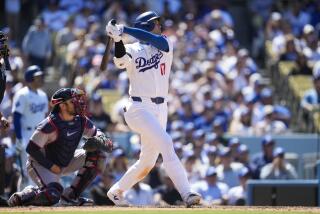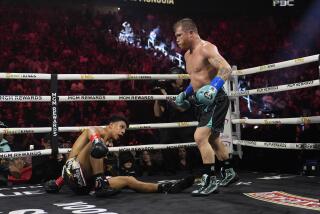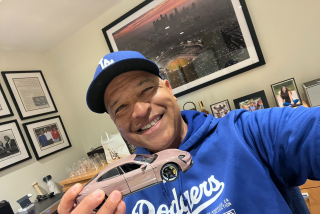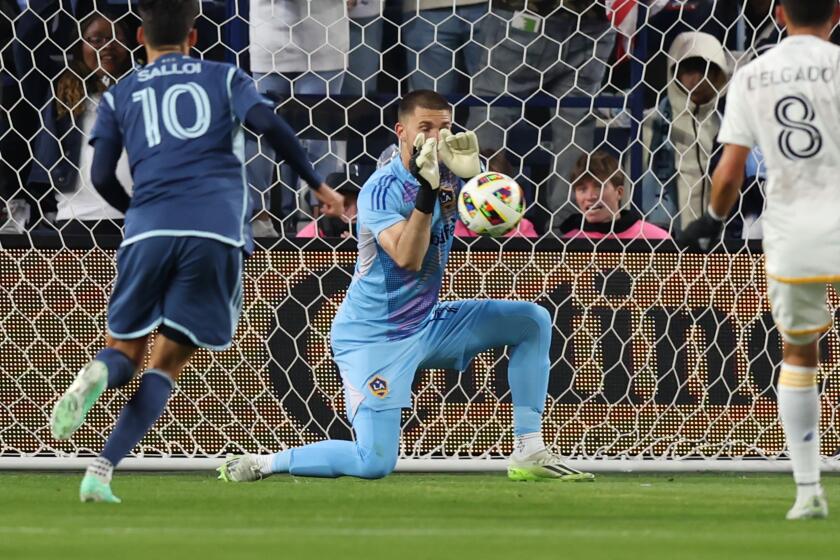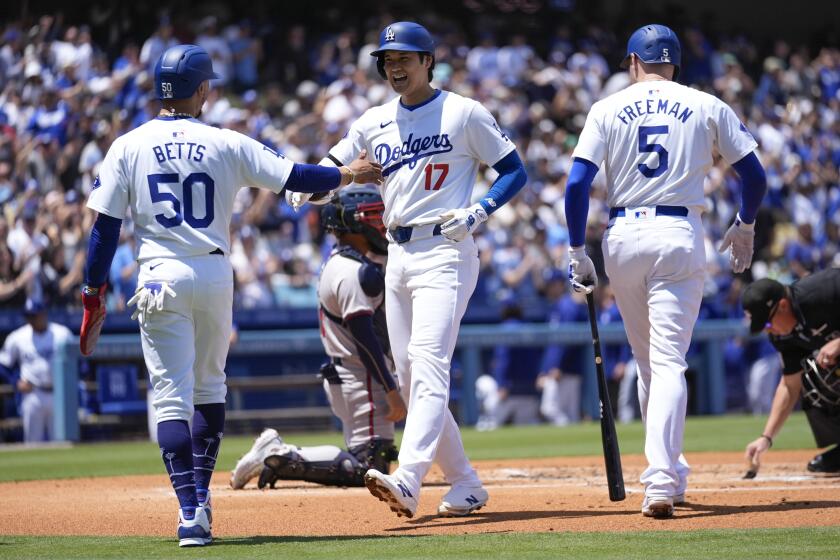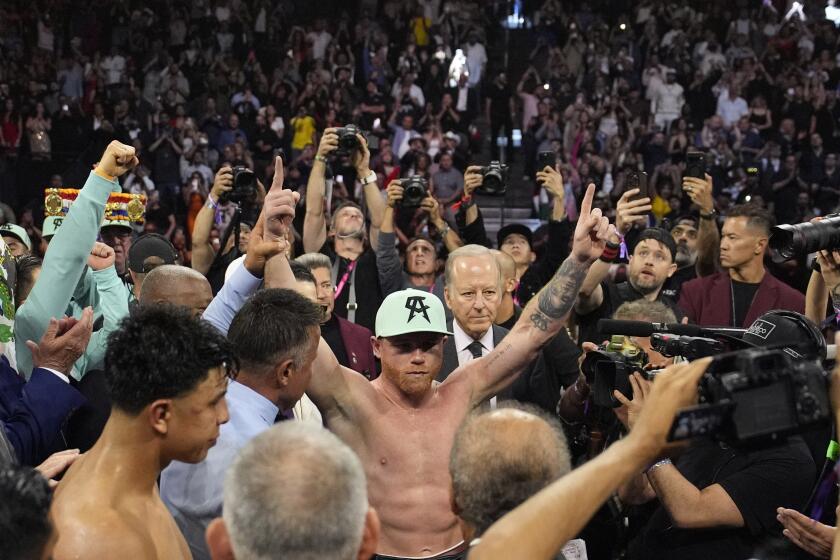Sources: Alex Rodriguez tested positive for steroids
On the day baseball issued its accounting of the steroid era, Jose Canseco wondered aloud why the Mitchell Report did not include Alex Rodriguez. On the day Sports Illustrated reported that Rodriguez tested positive for steroids six years ago, Canseco offered a terse response to the news.
“You guys are still questioning what I had to say?” he said Saturday.
According to the SI report, Rodriguez tested positive for two anabolic steroids during the 2003 season, the first of three seasons in which he won the American League most-valuable-player award. Rodriguez, the highest-paid player in baseball history and a 12-time All-Star, told SI he would not comment.
“You’ll have to talk to the union,” he said.
Neither the union nor the commissioner’s office would confirm nor dispute the SI report, with statements from both parties Saturday saying the 2003 test results were confidential.
Scott Boras, his agent, said Saturday that Rodriguez was out of the country but would issue a response “as we go forward.”
Players testing positive were not subject to punishment until 2004, so Rodriguez would not face suspension. Still, the report extends the shadow of baseball’s steroid era, dashing any sentiment that the all-time home run record would no longer be tainted if Rodriguez could break the mark now owned by Barry Bonds.
Bonds faces trial on perjury charges next month, with the federal government alleging he lied under oath by telling a grand jury he never had knowingly used steroids.
Canseco’s former lawyer, Rob Saunooke, said Saturday the publisher of Canseco’s first book, “Juiced,” deleted references to Rodriguez because Canseco had not witnessed Rodriguez using steroids.
Saunooke said references to Rodriguez were included in Canseco’s second book, “Vindicated,” only after Canseco passed a lie detector test that included the questions, “Did Alex Rodriguez ask you about steroids?” and “Did Alex Rodriguez ask where to get them?”
In “Vindicated,” Canseco said he had introduced Rodriguez to a supplier of steroids.
“I did everything but inject the guy myself,” Canseco wrote.
In 2007, Rodriguez told “60 Minutes” he never had used steroids or any other performance-enhancing substance.
Baseball tested for steroids for the first time in 2003, anonymously and without penalties, in order to assess the level of steroid use in the game. In 2004, baseball initiated a program in which players testing positive would be identified and suspended.
Of the 1,198 players tested in the 2003 survey, 104 tested positive, according to SI. The anonymity of the tests has been in question -- and debated in the courts -- ever since federal agents seized the 2003 results as part of the BALCO investigation.
Bonds was a focus of that investigation; Rodriguez never has been linked to it.
In Mitchell’s report, Canseco said he had discussed steroids with Roger Clemens, now the subject of federal perjury investigation after denying steroid use under oath. Clemens’ former trainer, Brian McNamee, claims he injected the pitcher with steroids; Clemens has sued McNamee for defamation.
McNamee’s attorney, Earl Ward, told The Times he has tried to learn whether Clemens tested positive in the 2003 survey but has been denied access to those results. Because Rodriguez’s test results have been reported, Ward said Saturday he would renew efforts to obtain the results for Clemens.
“Now that we know names are being released,” Ward said, “we’ll do our best to see those results as part of our discovery process.”
Curt Schilling, who criticized Canseco when both players testified before Congress in 2005, called Saturday for the commissioner’s office and players’ union to agree to release the names of all players testing positive in 2003.
“I’d be all for the 104 positives being named, and the game moving on, if that is at all possible,” Schilling wrote on his blog, 38pitches.com. “In my opinion, if you don’t do that, then the other 600-700 players are going to be guilty by association, forever.”
BALCO founder Victor Conte said in a statement to The Times that the SI report “may reveal more about the government than it does about A-Rod.”
On Friday, one day after federal court documents showed that prosecutors had information that Bonds had failed multiple drug tests, a San Francisco judge told prosecutors she might forbid them from discussing those results during the trial without stronger evidence linking Bonds to them.
Added Conte: “The timing of the leaked information does not seem to be coincidental. . . . It is far easier to convict someone in the court of public opinion without due process in a court of law, so the government seems to have made this its focus.”
Rob Manfred, baseball’s executive vice president for labor relations, said in a statement that the commissioner’s office was “disturbed by the allegations” in the SI story. That office is expected to pursue an investigation into the SI report that Gene Orza, the chief operating officer of the players’ union, tipped Rodriguez to a pending drug test in 2004.
“I’m not interested in discussing this allegation with you,” Orza told SI.
“Any allegation of tipping . . . is of grave concern to Major League Baseball,” Manfred said in his statement, “as such behavior would constitute a serious breach of our agreement.”
The union statement denied any “improper tipping.” In a letter to Congress last year, union executive director Donald Fehr said, “No player was told when he or anyone else would be tested.”
In 2004, according to the Mitchell Report, an unnamed former major leaguer said that Orza told him he had tested positive in 2003 and would be tested “in the next two weeks.”
According to the report, the union in 2004 notified those players whose test results had been seized that their information “was now in the hands of the government.”
The report that Rodriguez tested positive for steroids follows a turbulent 18 months in which he opted out of the richest contract in baseball during the World Series, circumvented his agent to sign an even richer contract with the New York Yankees, endured a divorce and tabloid headlines linking him to Madonna and played on the first Yankees team to miss the playoffs since 1993.
Dodgers Manager Joe Torre, in his new book, “The Yankee Years,” revealed that New York teammates and coaches tagged Rodriguez as “A-Fraud.”
David Carter, executive director of the USC Sports Business Institute, said he did not expect the report to significantly sway the public image of Rodriguez. Fans largely “have gone tone-deaf” to steroids stories, Carter said, and Rodriguez’s image was not pristine before Saturday.
“The like or dislike of him is already set in stone,” Carter said. “For fans that support him and support the Yankees, this may not be a big deal. For fans that never supported him and despised the Yankees, it supports their position as well.”
Times staff writers Kevin Baxter, Dylan Hernandez and Lance Pugmire contributed to this report.
--
More to Read
Get our high school sports newsletter
Prep Rally is devoted to the SoCal high school sports experience, bringing you scores, stories and a behind-the-scenes look at what makes prep sports so popular.
You may occasionally receive promotional content from the Los Angeles Times.
